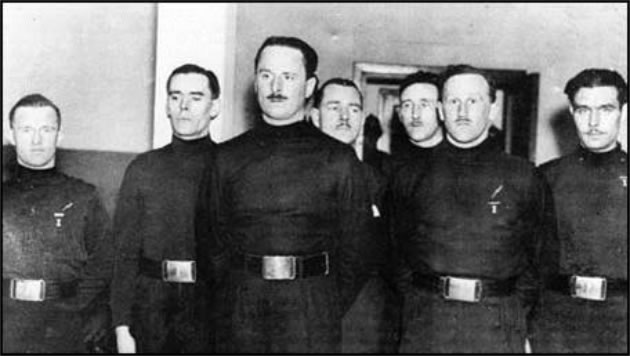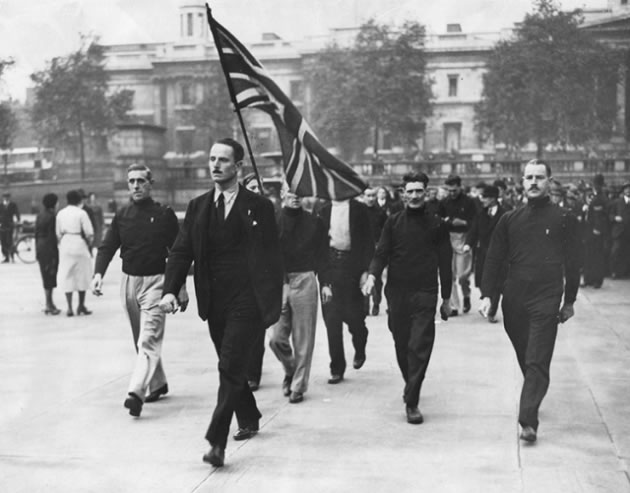Fascists Come to Chiswick Town Hall
When Lord Haw-Haw and Oswald Mosley brought the blackshirts to W4

William Joyce is on the left and Mosley is second from left. Picture: Wikimedia Commons
Research has put the spotlight on a dark corner of Chiswick’s history when two of the country’s most notorious fascists came to town.
Dr. Steven Woodbridge, a Senior Lecturer in History at Kingston University, had done previous work on William Joyce, better known as Lord Haw-Haw, the traitor who broadcast propaganda in English for the Nazis during the Second World War. In 2016 Emeritus Professor Colin Holmes published a biography of Joyce which Dr. Woodbridge believes is likely to be his definitive biography for some time. In it he makes a brief reference to a visit made by Joyce to Chiswick. In recent years, Dr Woodbridge had been conducting his own research into local fascism in Chiswick and Brentford during the interwar period.
Joyce had joined the British Union of Fascists in 1932 shortly after it was founded by Sir Oswald Mosley. His rabble-rousing, anti-Semitic speeches were a staple of BUF meetings and the organisation developed a sophisticated propaganda effort with posters and leaflets as well as regular meetings across the country. Joyce became known as the ‘Professor’ by members of the organisation.
One Monday evening in March 1934 Joyce was the star attraction at a ticket only meeting of the BUF held at Chiswick Town Hall. He delivered an impassioned speech lasting an hour and three quarters to a crowded room. After taking a brief break he returned to the hall to answer questions from the audience for an hour.
A reporter from the local newspaper said it ‘must have been one of the most orderly meetings’ held by the BUF since their foundation. Often other events organised by them had ended in violence.
Another local newspaper columnist also remarked on the discipline of the audience saying, ‘I think that Mr. William Joyce was preaching largely to the converted – judging by the complete absence of interruptions. Or perhaps it may be that the would-be humourists were subdued by a healthy respect for the hearty-looking youths in black shirts that surrounded the hall’.
In his speech Joyce said that fascism could be described as ‘constructive patriotism’ and claimed that it was ‘the supreme reality of the age in which they lived’. He told the assembly in Chiswick that large number of Jews were coming to the country taking jobs from British people.
He defended Mussolini and Hitler saying, ‘it must be admitted that they had given their people material benefits’, and this ‘spirit of philosophical regeneration’ must come to Britain. He said the BUF would not disassociate themselves from ‘two of the greatest men in Europe’. He argued that democracy in Britain should be replaced by ‘a Fascist dictatorship’, based on the ‘will of the people’.

Mosley and the British Union of Fascists in Trafalgar Square. Picture: Wikimedia Commons
Dr Woodbridge concludes that the BUF must have been encouraged by their Chiswick meeting because just a few weeks later the movement founded a Brentford and Chiswick branch, and opened a local HQ at 98, High Street, Brentford. However, the anticipated rush of membership seems not to have materialised as recruitment from the local area was not significant.
However, they were not discouraged by this set back and returned to the area a few years later with another meeting at Chiswick Town Hall, held in February, 1938. Joyce had left the BUF by this time to form the National Socialist League so it was A.K. Chesterton (a second cousin of G.K.) who was the main speaker. Chesterton went on to found the National Front after the war.
In July of the same year, Mosley himself came to Chiswick holding an open air rally on the High Road. He addressed the audience standing on the top of a van using two microphones. Three hundred police officers were at the event but the local newspaper said that the crowd who attended were orderly.
In March 1939 Mosley returned to Chiswick to address what was described as a packed town hall to argue that Britain should not go to war with Germany. That was the month in which Hitler occupied the parts of Czechoslovakia he had not been ceded as part of the Munich Agreement the previous September. Outside the meeting the construction of air raid shelters had been commenced as the rest of the country had come to recognise the inevitability of war.
A few months later William Joyce and his wife took a boat to Germany and offered their assistance to the Nazis. He went to work for the ministry of propaganda run by Goebbels and became a broadcaster with a programme called Germany Calling which aimed to undermine British morale. It was then he was dubbed Lord Haw-Haw.
Historians are divided on the effectiveness of Joyce’s broadcasts. Dr Woodbridge says, “at the risk of stereotyping about aspects of the national character, one of the best weapons against the Nazis was, arguably, good old-fashioned British scepticism, combined with a sense of humour. The majority of people in this country, and probably in Chiswick too, appear to have tuned into the broadcasts by ‘Lord Haw-Haw’ more for entertainment value, as the BBC’s own broadcasting services at the time were viewed as rather dry and boring.”
Joyce was hanged as a traitor in 1946. Mosley was first imprisoned and then placed under house arrest during the war. He returned to politics afterwards but with little success, standing in the 1959 general election at Kensington North on a platform of opposing immigration from the West Indies and mixed marriage. He achieved 7.6% of the vote. He died in 1977.
You can read Dr. Woodbridge’s blog post on the subject here.
May 23, 2020